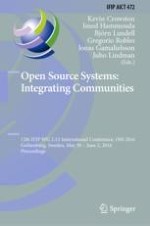2016 | Buch
Open Source Systems: Integrating Communities
12th IFIP WG 2.13 International Conference, OSS 2016, Gothenburg, Sweden, May 30 - June 2, 2016, Proceedings
herausgegeben von: Kevin Crowston, Imed Hammouda, Björn Lundell, Gregorio Robles, Jonas Gamalielsson, Juho Lindman
Verlag: Springer International Publishing
Buchreihe : IFIP Advances in Information and Communication Technology
